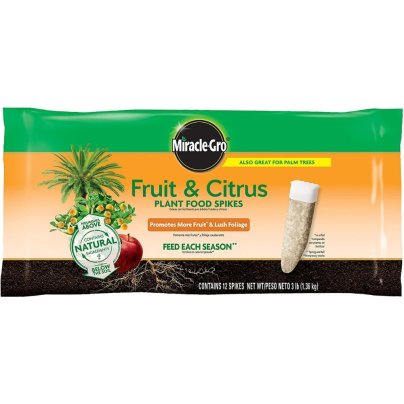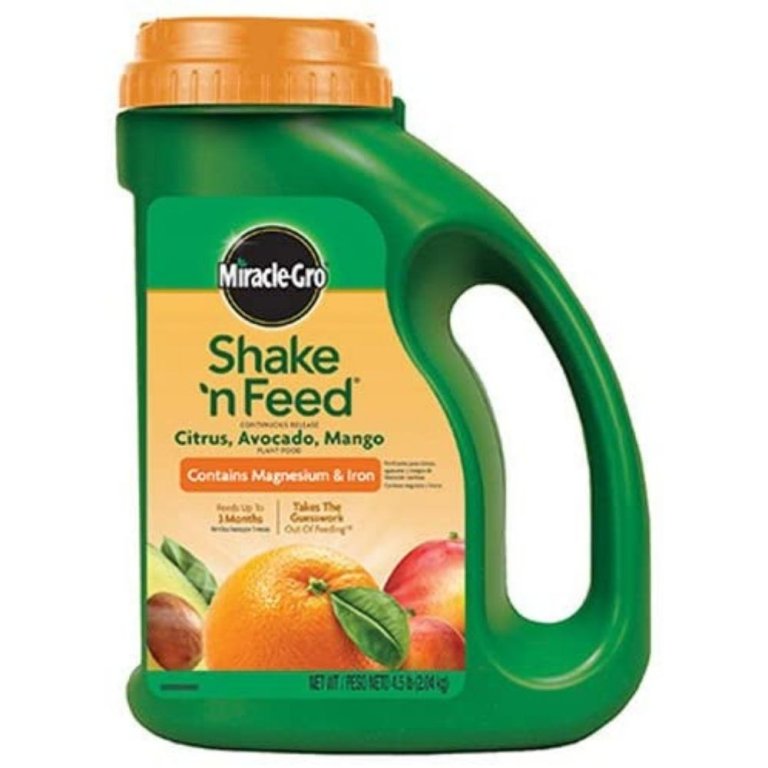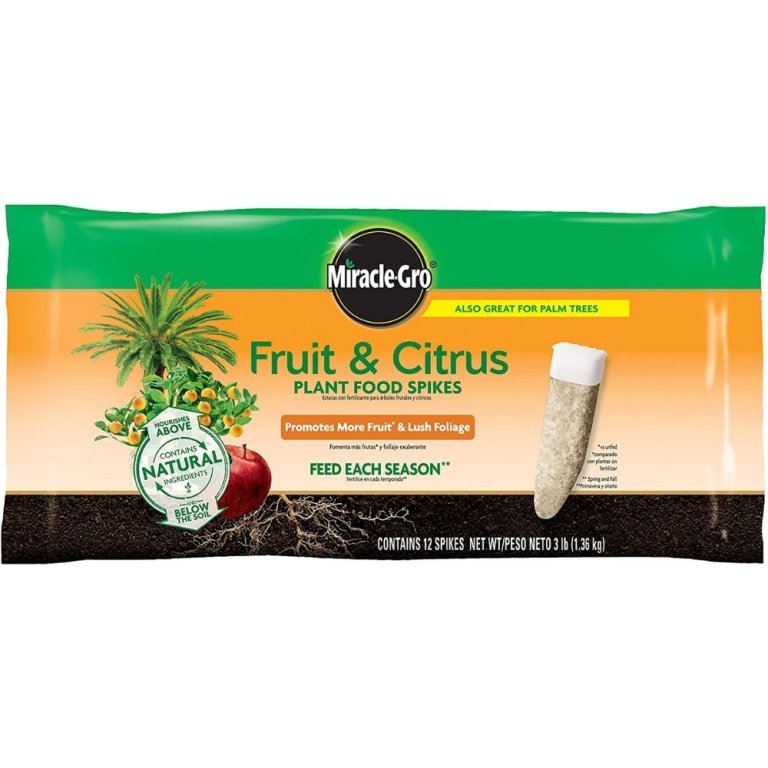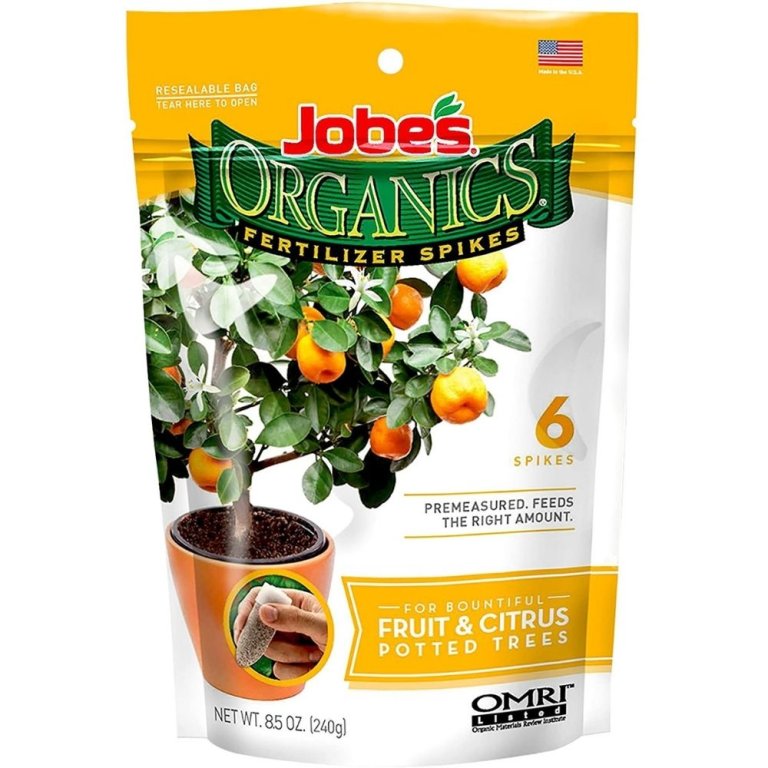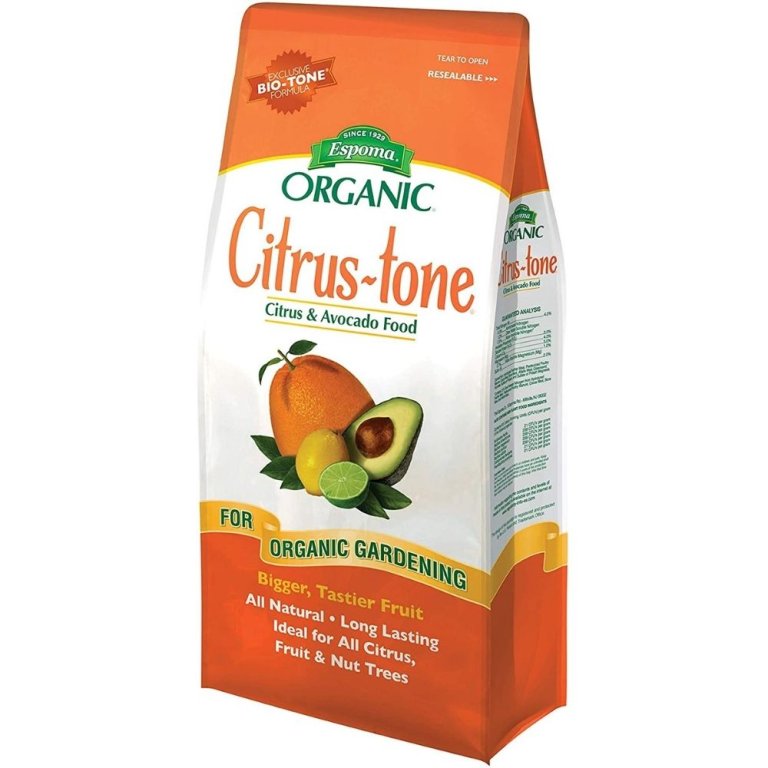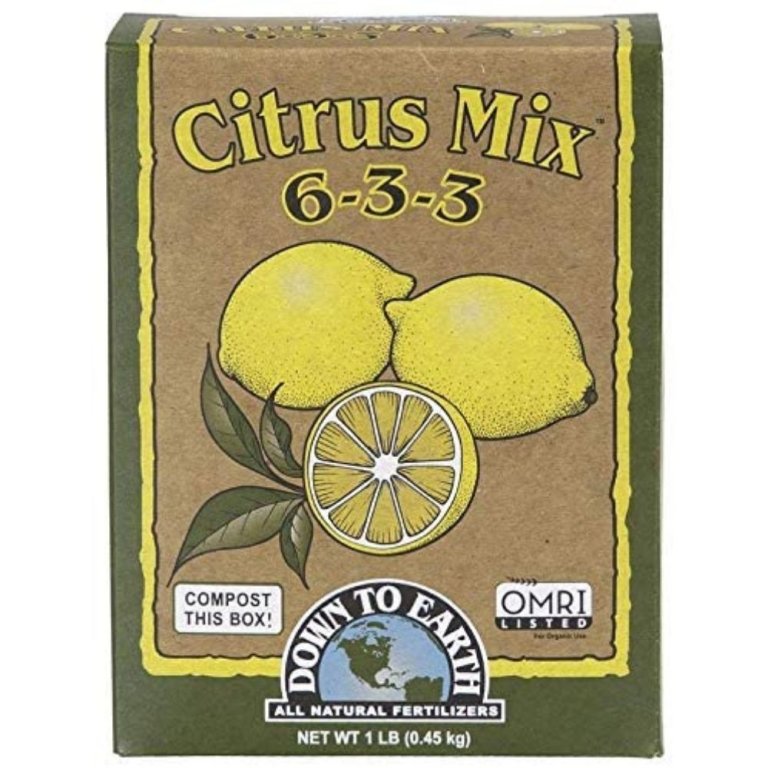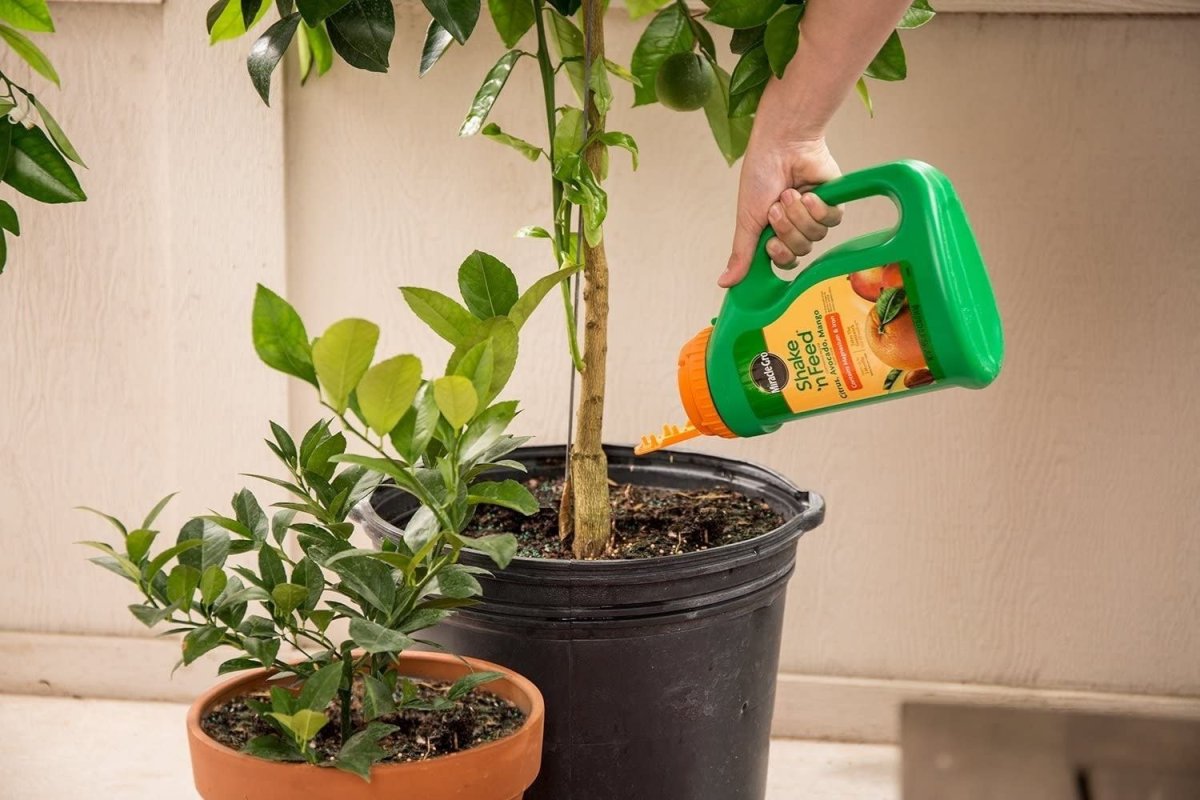
We may earn revenue from the products available on this page and participate in affiliate programs. Learn More ›
Like other fruit trees, citrus trees thrive when they have the nutrients they need to develop healthy root systems, strong trunks, and branches. The healthier the tree, the more large, delicious fruits it produces. Trees absorb many of the nutrients they need through their roots, but not all soil is ideal for fruit production. That’s where citrus fertilizers come in—they provide an optimal blend of nutrients citrus trees need to flourish.
The best citrus fertilizer for one tree grower is not necessarily the best one for another. Factors such as current soil quality, the tree’s specific needs, and the type of fertilizer all play a role in determining the best choice for your situation. Ahead, learn what to look for when shopping for a citrus fertilizer, and find out why the following products are top options for most citrus growers.
- BEST OVERALL: Miracle-Gro Shake ‘N Feed Citrus Plant Food
- RUNNER UP: Miracle-Gro Fruit & Citrus Plant Food Spikes
- BEST ORGANIC: Jobe’s Organics Fruit & Citrus Fertilizer Spikes
- BEST LONG-LASTING: Espoma Citrus-tone 5-2-6 Plant Food
- HONORABLE MENTION: Down to Earth Organic Citrus Fertilizer Mix
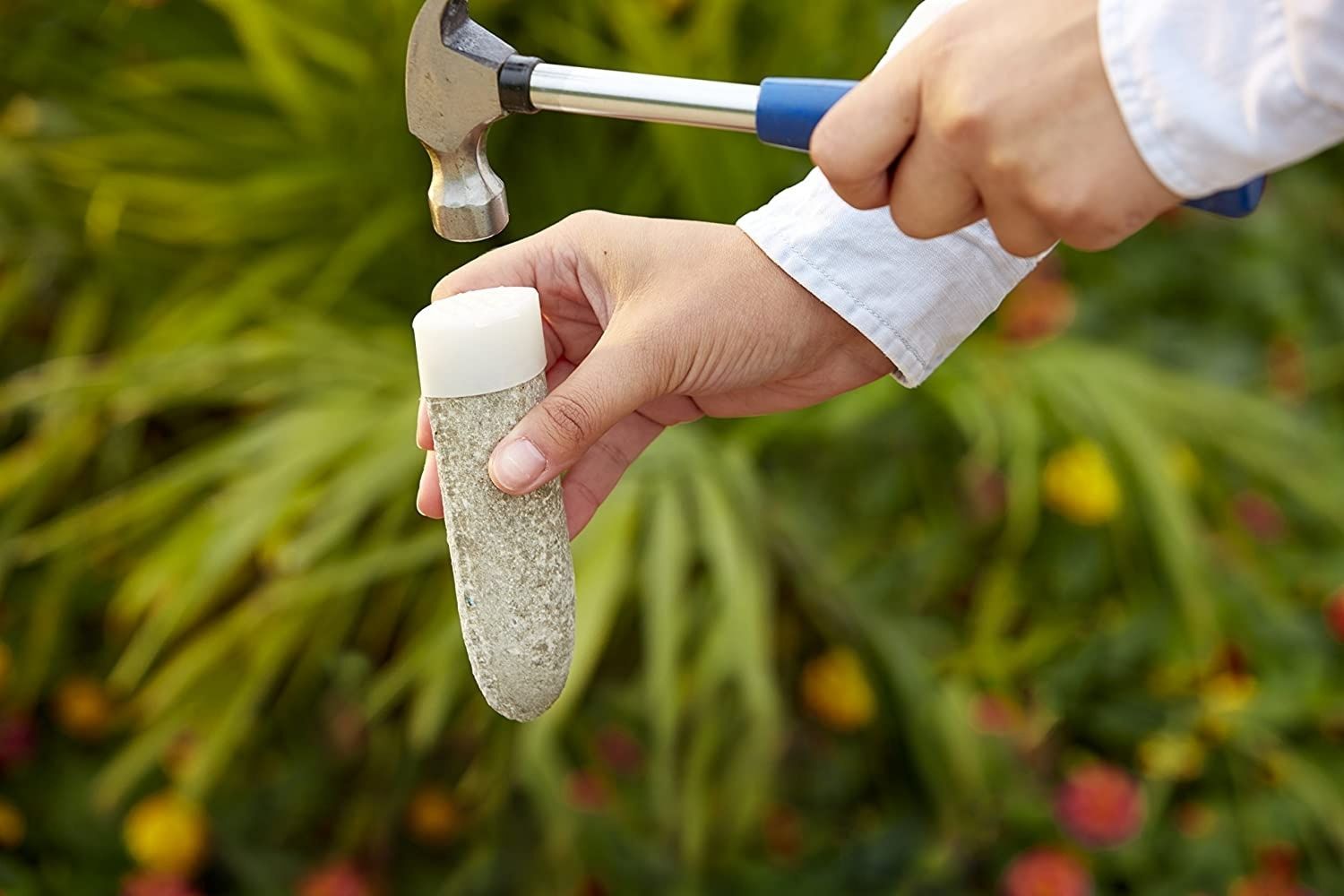
What to Consider When Choosing the Best Citrus Fertilizer
Citrus fertilizers are formulated to address the specific needs of orange, grapefruit, and lemon trees, which differ from other types of trees. Don’t assume a fertilizer that’s meant for cedar trees or a general garden fertilizer will benefit citrus trees. The tree’s age, how recently it was planted, and the soil’s natural nutrient content are all important to think about when selecting the best citrus fertilizer.
Organic vs. Inorganic
While all citrus fertilizers supply orange, lemon, and lime trees with nutrients, the products vary in type and the way they work. Many citrus fertilizers on the market today are inorganic fertilizers, although organic fertilizers are also available.
- Organic: This type of fertilizer is natural and contains ingredients such as poultry manure, earthworm castings, or compost (biodegraded vegetable waste). It contains no chemicals. For citrus growers who want the most natural fruits, organic fertilizers are indispensable.
- Inorganic: As opposed to organic, inorganic fertilizers contain chemical or synthetic ingredients, such as nitrogen, potassium, sulfur, and phosphorus. Inorganic fertilizers are often slightly less expensive than organic fertilizers, but they tend to be lost in soil quickly. Multiple applications may be required during a growing season.
Chemical Fertilizer Content
Citrus trees obtain some of the nutrients they need from the sun, the air, and water, but others must come from the soil, and this is where supplementing with plant food comes in. Commercial fertilizers are labeled by the amount of nitrogen (N), phosphorus (P), and potassium (K) they contain, which is listed in N-P-K format.
A bag of 10-10-10 fertilizer indicates it has 10 percent nitrogen, 10 percent phosphorus, and 10 percent potassium by weight. Citrus fertilizers come in a variety of NPK formulations because soil content differs. A fertilizer that’s right for a grower in Florida may not be optimal for a grower in Arizona.
For the best results, growers should first have the existing soil tested and analyzed and then choose a citrus fertilizer that complements the soil’s nutrient content.
Form
Fertilizer products for citrus trees come in three primary forms: liquid, granular, and spike, each with its own benefits and drawbacks.
- Liquid: Liquid fertilizers come in either a ready-to-use solution or a concentrated solution designed to be diluted in water. Roots quickly absorb liquid fertilizers. Many liquid fertilizers can also—depending on the product—be applied by spraying the tree’s foliage, which is the quickest way for the tree to absorb the nutrients.
- Granular: Resembling tiny pellets or grains, granular fertilizers are sprinkled on the soil under the tree and then worked into the ground with a rake or shovel. Some granular products are time-released. These polymer-coated granules dissolve slowly and offer trees a long-term supply of nutrients that can last an entire growing season or longer.
- Spikes: For growers looking for more of a one-and-done fertilizing option, spikes may be the way to go. The spikes are driven into the soil around the tree, and, for months, they gradually dissolve, offering long-term feeding. Cost-wise, spikes are pricier than liquid and granular fertilizers, which is why they are perhaps best suited to those who have just a few trees, or potted trees.
Growing Stages
Citrus trees require various amounts of fertilizer based on their age and the nutrient content of the soil; for the best results, have the existing soil tested and ask a qualified fruit tree specialist to determine exact nutrient needs. In general, however, most citrus trees grow best with the following guidelines.
According to the University of Arizona, orange, tangerine, and grapefruit trees do best when fertilized three times per year—in January or February, again in March or April, and once more in May or June. Use just one-third the amount of fertilizer recommended on the package for each of the three feedings. For lemons and limes, postpone the third feeding until August or September.
Newly planted citrus trees—until they’re two years old—don’t need fertilizer. Just water regularly to ensure they become established.
Desired Effect
In addition to robust root development and healthy foliage, citrus trees require fertilizer to help them produce ample blossoms because a blossom is the start of every orange or lemon. A fertilizer that’s high in phosphorus helps boost bloom production, which is the first step to growing a bumper crop of citrus fruits.
Still, the whole tree’s health must be taken into consideration, which is why it’s so important to have the soil tested and then select a fertilizer with an NPK analysis that best suits the individual tree’s nutritional needs.
Our Top Picks
To qualify as a top pick, a citrus fertilizer should contain high-quality ingredients. While fertilizers may vary by type and NPK analysis, the best citrus tree fertilizer will supply the nutrients needed to correct soil deficiencies and create an optimal environment for the tree to thrive.
Best Overall
Miracle-Gro Shake 'N Feed Citrus Plant Food
Pros
- Granular formula specifically for citrus nutrients (and palm trees)
- Encourages strong root and lead development
- Easy application by sprinkling granules from shaker container
- Each application feeds for up to 3 months
Cons
- Natural and chemical ingredients (not organic)
- Requires three to four applications per year
- Granules require some raking into the soil before watering
Product Specs
- Type: Granular fertilizer
- NPK Ratio: 8-2-10
- Quantity: 4.5 pounds
This granular fertilizer combines citrus-loving nutrients, including potassium, magnesium, sulfur, and iron, among other nutrients, for an NPK ratio of 8-2-10. It’s a good option for encouraging strong root and foliar development and for encouraging fruit production.
The fertilizer is easy to apply—just sprinkle the granules beneath the citrus tree at a rate of 1.75 tablespoons per square foot, taking care to avoid contact with the trunk. The granules should then be worked into the soil’s surface with a rake or shovel before watering. The fertilizer comes in a 4.5-pound container with a shaker top for easy application.
Get Miracle-Gro Shake N’ Feed plant food on Amazon and at Walmart.
Runner Up
Miracle-Gro Fruit & Citrus Plant Food Spikes
Pros
- Apply only twice per year for continuous feeding
- Contains natural ingredients to help citrus tree health and fruiting
- Nutrients release directly toward tree roots
- Easy to use with just a hammer or rubber mallet
Cons
- Spikes can break up if hammered too hard
- Pricier solution than granules or liquid
- Natural and chemical ingredients (not organic)
Product Specs
- Type: Fertilizer spikes
- NPK Ratio: 10-15-15
- Quantity: 12 spikes
Miracle-Gro’s time-release fruit and citrus spikes are inserted into the soil once in the spring and then again in the fall. They provide trees the nutrients they need for healthy roots, lush foliage, and increased fruit production.
The spikes are simple to use. First, top the spikes with the plastic caps that come in the package and use a hammer to drive the spikes into the ground at the tree’s drip line, spacing them 3 feet apart. The Miracle-Gro spikes feature a 10-15-15 formulation derived from natural ingredients such as feather meal, bone meal, and magnetic rock. Hammer the spikes in, and then spend time tending to other garden and orchard tasks.
Get the Miracle-Grow fertilizer spikes on Amazon and at Walmart.
Best Organic
Jobe's Organics Fruit & Citrus Fertilizer Spikes
Pros
- Better than liquid for potted trees (nutrients don’t wash out)
- Spikes dissolve slowly to supply steady nutrients
- Easy to apply and last 4 to 6 weeks each
- Natural ingredients for citrus and certified organic
Cons
- Must follow directions carefully to avoid overfertilizing potted citrus
- Dogs can be attracted to smell and eat spikes
Product Specs
- Type: Fertilizer spikes
- NPK Ratio: 4-6-6
- Quantity: 6 spikes
Using liquid fertilizer on potted trees can result in the fertilizer washing out the drain holes along with the water. To ensure a steady supply of nutrients for citrus trees in containers, consider these fertilizer spikes from Jobe’s Organics.
These spikes dissolve slowly, providing a consistent supply of 4-6-6 fertilizer for weeks. They contain natural ingredients, including bone meal and feather meal, as well as microbiomes that encourage soil health and increased fruit production.
When fertilizing potted citrus trees, insert two spikes per 12-inch-diameter container. For best results, insert new spikes every four to six weeks. Using these fertilizer spikes is mess-free and easy, and they provide a continuous supply of citrus-loving nutrients. One package contains six spikes.
Get the Jobe’s Organics fertilizer spikes on Amazon and at Walmart.
Best Long-Lasting
Espoma Citrus-tone 5-2-6 Plant Food
Pros
- Organic citrus fertilizer that promotes growth and large, flavorful fruit
- Can last up to 2 years before reapplying
- Granulated slow-release formula
- Contains beneficial microbes to improve soil health around the tree
Cons
- User must rake granules into soil and water as directed
Product Specs
- Type: Granular fertilizer
- NPK Ratio: 5-2-6
- Quantity: 8 pounds
For robust growth and large, flavorful fruits, Espoma’s fertilizer is a terrific organic option. This granulated fertilizer helps citrus trees thrive. Sprinkle 6 cups per citrus tree with a 3-foot canopy spread. Larger trees will need more food.
This is a long-term fertilizer that dissolves slowly and will feed a tree for up to two years before re-application is necessary. It contains beneficial bone meal, poultry manure, and alfalfa, in addition to other natural ingredients. After application, work the granules into the soil and then water well.
Get Espoma citrus plant food at Amazon, The Home Depot, and Walmart.
Honorable Mention
Down to Earth Organic Citrus Fertilizer Mix
Pros
- All-natural product with organic certification
- Balanced formula with added ingredients for lush growth
- Granular formula applied three to four times per year
- Comes in a compostable box
Cons
- Must be applied up to four times
- Granules require some raking into the soil before watering
Product Specs
- Type: Granular fertilizer
- NPK Ratio: 6-3-3
- Quantity: 5 pounds
Those who want to use all-natural products on their citrus trees need look no further. Listed by the Organic Materials Review Institute (OMRI) for use in organic gardening, this 6-3-3 granulated formula provides an optimal nitrogen-phosphorus-potassium ratio from ingredients such as feather meal, fishbone meal, and kelp meal. Calcium, sulfur, and other nutrients are also included in the formula.
To encourage lush growth and new blossoms, sprinkle this granular around the tree base three to four times per year, at the rate of 1 cup per 1 inch of trunk diameter. After application, work the granules into the soil with a rake and water well.
Get the Down to Earth citrus fertilizer on Amazon and at Walmart.
Our Verdict
The best citrus fertilizer should support healthy root and leaf growth and boost flowering and fruiting. Our top pick, Miracle-Gro plant food, can feed new and existing fruit trees. Those who prefer an organic solution can look to several choices on this list, including Jobe’s Organics fertilizer spikes for a natural and easy application.
How We Chose the Best Citrus Fertilizers
Citrus fertilizers are formulated to address the specific needs of orange, grapefruit, and lemon trees, which differ from other types of trees. The tree’s age, how recently it was planted, and the soil’s natural nutrient content are all important to think about when selecting the best citrus fertilizer. We considered nutrient content, whether formulations were organic, and the form in which the fertilizer comes to compile this carefully curated list of the best citrus fertilizers. Form is a matter of convenience for some citrus tree growers, so we included different types.
In addition, gardeners should be aware of the best time to fertilize citrus trees in their growing region, which might affect fertilizer choice. When used as directed, these fertilizers should give citrus lovers the result they desire—robust root development, healthy foliage, and ample fruit production.
FAQs
Fresh oranges, limes, and grapefruits are the essence of summer. When gardeners fertilize citrus trees, they will see larger harvests and healthier trees. Those new to growing citrus fruits are likely to have some questions.
Q: Do citrus trees need special fertilizer?
The majority of citrus trees will do well with an all-purpose citrus fertilizer. Still, depending on the existing soil’s nutrient composition, the fertilizer may need more of one nutrient than another. The safest bet is to have the soil tested and then purchase a fertilizer that supplies the missing nutrients.
Q: What is the best time to fertilize citrus trees?
Newly transplanted trees may not need fertilizing for two years, while established citrus trees may require feeding every few weeks, starting in early spring. The best timing for fertilizing also depends on the product used to fertilize the trees.
Q: How do you fertilize citrus trees?
Various products are applied differently, so follow package directions carefully. In general, liquid fertilizers are either sprayed on the tree’s foliage or poured beneath the tree, while granular fertilizers may be sprinkled under the tree and then worked into the soil. Fertilizer spikes are inserted in the soil of potted trees or driven into the soil around in-ground trees.
Glenda Taylor is a freelance writer for the residential remodeling, homebuilding, and commercial roofing industries. She and her husband have been general contractors for over 20 years, and Ms. Taylor has written for leading media outlets as well as National Association of Homebuilders. In addition to her construction experience, Ms. Taylor is a Master Gardener, a former real estate professional, a universal design enthusiast, and an advocate for green building practices. The recipient of Journalism and Marketing degrees from the University of Kansas and Bauder College respectively, she enjoys life on a farm in the Midwest with her husband and their five Saint Bernards!

